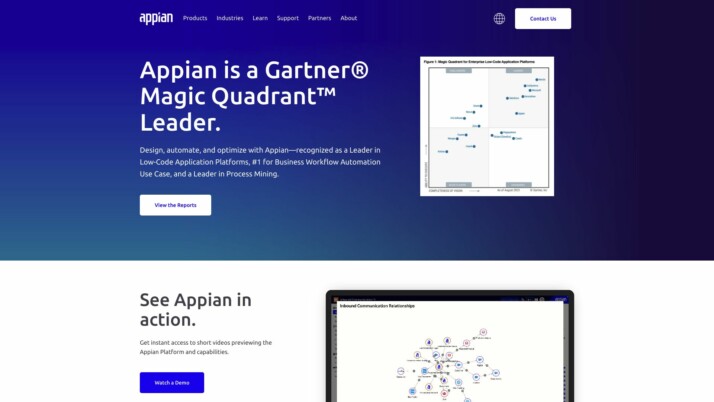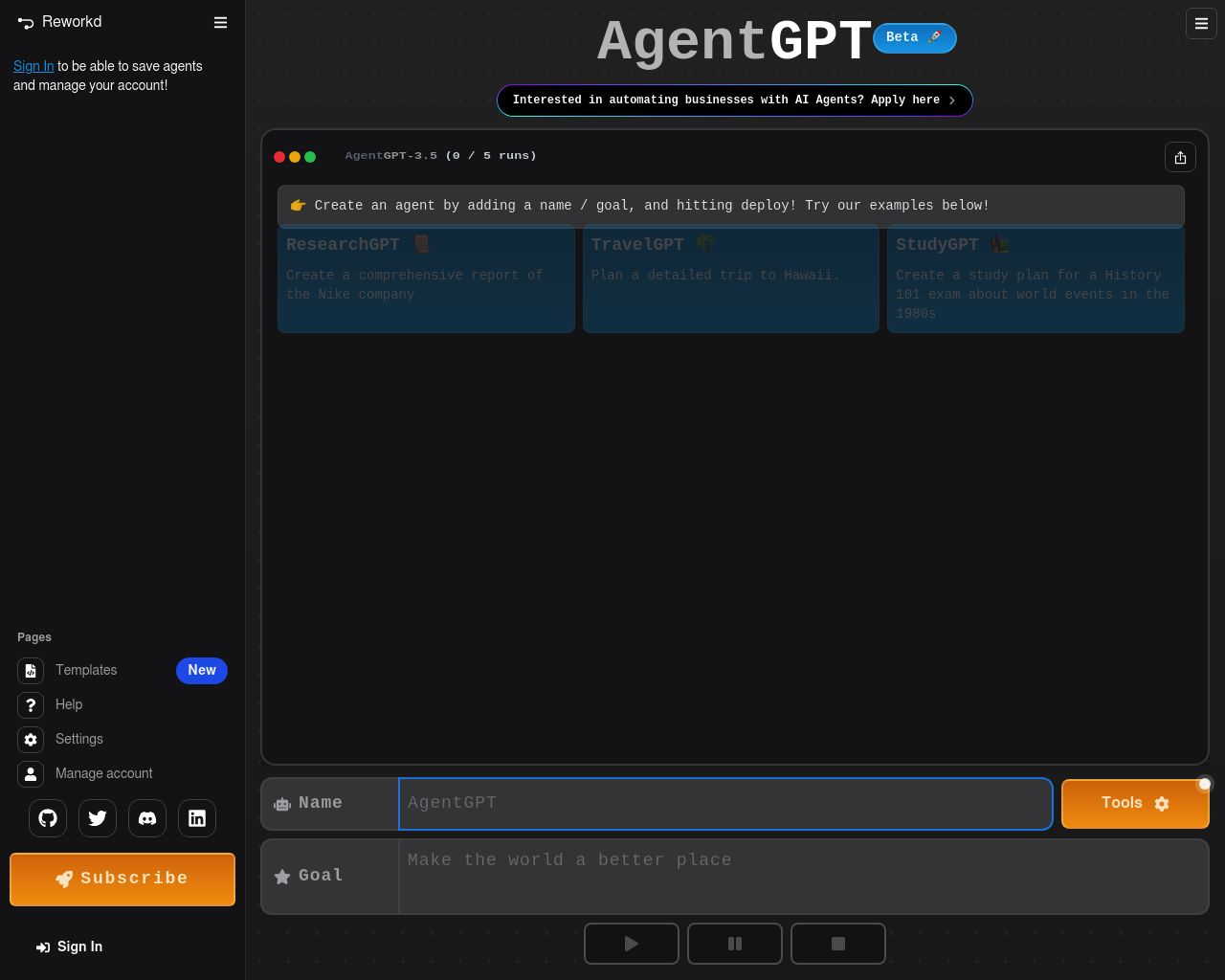Appian vs. AgentGPT: AI Integration Showdown
AI platforms revolutionize business processes, but choosing the right solution can be daunting. This comparison dives into Appian vs. AgentGPT, and SmythOS, exploring their unique approaches to AI integration. Appian offers enterprise-level low-code development, while AgentGPT specializes in autonomous AI agents. SmythOS emerges as a comprehensive solution, combining powerful features with user-friendly design.
We’ll examine each platform’s strengths, limitations, and ideal use cases, empowering you to make an informed decision for your AI needs. Whether you’re a developer seeking advanced customization or a business leader looking to streamline operations, this analysis provides the insights to guide your AI journey.
Appian Overview
Appian empowers organizations to integrate artificial intelligence into their business processes through a low-code development platform. The company’s AI-enhanced automation suite combines powerful AI capabilities with intuitive design tools, enabling both technical and non-technical users to create intelligent applications.


Appian’s platform excels in document processing, email classification, and generative AI tasks. Its AI Skill Designer allows users to build custom AI models without extensive data science expertise. The platform also includes pre-built AI capabilities for common use cases, accelerating development and deployment.
Security and privacy are paramount in Appian’s approach. The platform ensures AI models and data remain under the user’s control, addressing crucial concerns for enterprises handling sensitive information. Appian’s Enterprise Copilot feature leverages this secure framework to provide instant answers from curated document sets, enhancing information retrieval and decision-making processes.
Appian’s platform excels in document processing, email classification, and generative AI tasks. Its AI Skill Designer allows users to build custom AI models without extensive data science expertise.
While Appian offers robust AI integration and low-code development options, it may not provide the depth of customization required for highly specialized AI applications. The platform’s strengths lie in its ability to rapidly deploy AI-enhanced business processes rather than in developing cutting-edge AI research models.
Appian’s AI capabilities seamlessly integrate with its broader process automation tools, creating a comprehensive ecosystem for digital transformation. This integration allows businesses to enhance existing workflows with AI, rather than treating AI as a separate, siloed technology. The platform’s scalability supports both small-scale pilots and enterprise-wide deployments, making it suitable for organizations at various stages of AI adoption.
In the competitive landscape of AI platforms, Appian positions itself as a bridge between traditional business process management and cutting-edge AI technologies. Its focus on practical, business-oriented AI applications sets it apart from pure AI research platforms. However, organizations requiring highly specialized AI models or extensive customization may find Appian’s offerings somewhat constrained compared to more flexible, code-centric alternatives.
AgentGPT Overview
AgentGPT empowers users to create and deploy customizable AI agents directly in a web environment. Unlike traditional chatbots, AgentGPT focuses on achieving broad, goal-oriented tasks autonomously. The platform’s web-based interface sets it apart from locally-operated alternatives, offering accessibility and ease of use.


AgentGPT boasts features like user authentication, agent run saving and sharing, dynamic translations, and AI model customization. Its web browsing capabilities and Stripe integration for paid versions enhance its versatility. The platform’s use of vector databases for memory management allows AI agents to retain execution history and access long-term memory, significantly improving their functionality over extended periods.
AgentGPT boasts features like user authentication, agent run saving and sharing, dynamic translations, and AI model customization. Its web browsing capabilities and Stripe integration for paid versions enhance its versatility.
Developers and businesses benefit from AgentGPT’s scalable cloud offering and seamless integration with tools like LangChain. The platform’s commitment to accessibility and continuous evolution, driven by community contributions, makes it an attractive option for those seeking to streamline operations and boost efficiency through AI.
However, AgentGPT faces challenges in areas such as multimodal capabilities and advanced debugging tools. While it excels in web-based autonomous agent creation, it may not offer the same level of sophistication in areas like multi-agent collaboration or scheduled task execution as some competitors.
AgentGPT’s vision centers on democratizing AI technology, making advanced tools accessible to a wider audience. This approach aligns well with the needs of developers and businesses looking to implement AI solutions without extensive specialized knowledge. As the platform continues to evolve, it maintains its focus on fostering innovation and ensuring ethical AI practices, positioning itself as a valuable tool in the rapidly advancing field of AI agent development.
Feature Comparison
Appian and AgentGPT offer distinct approaches to AI integration and development, with key differences in their core components and security features. Appian excels in providing a comprehensive low-code platform for enterprise-level AI integration, while AgentGPT focuses on creating autonomous AI agents in a web environment.
Appian’s strength lies in its robust process automation and AI integration capabilities tailored for business workflows. It offers visual builders and no-code options, making AI accessible to non-technical users. However, Appian lacks specific features for autonomous agent creation and multi-agent collaboration. Its security measures are enterprise-grade, with strong data encryption and API authentication, but it does not offer the same level of AI model customization as AgentGPT.
AgentGPT, on the other hand, specializes in creating autonomous AI agents with a focus on achieving broad, goal-oriented tasks. It provides features like agent run saving and sharing, and uses vector databases for enhanced memory management. However, AgentGPT falls short in areas such as debug mode, multimodal capabilities, and scheduled task execution. While it offers user authentication and some security features, it may not match Appian’s enterprise-level security standards.
The feature gaps between these platforms highlight their different target audiences and use cases. Appian is better suited for businesses looking to integrate AI into existing processes, while AgentGPT caters to users seeking to create standalone, autonomous AI agents for specific tasks. The choice between them depends on the specific needs of the project and the level of AI integration required within an organization’s existing infrastructure.
Feature Comparison Table
| Appian | AgentGPT | SmythOS | |
|---|---|---|---|
| CORE FEATURES | |||
| Hosted Agents (Dev, Production) | ❌ | ✅ | ✅ |
| Visual Builder | ✅ | ❌ | ✅ |
| No-Code Options | ✅ | ❌ | ✅ |
| Autonomous Agents | ❌ | ✅ | ✅ |
| Explainability & Transparency | ✅ | ❌ | ✅ |
| Multi-Agent Collaboration | ❌ | ✅ | ✅ |
| Human-AI Interaction | ✅ | ❌ | ✅ |
| Agent Work Scheduler | ❌ | ✅ | ✅ |
| SECURITY | |||
| Constrained Alignment | ✅ | ❌ | ✅ |
| IP Control | ✅ | ❌ | ✅ |
| COMPONENTS | |||
| Foundation AIs | ❌ | ❌ | ✅ |
| Huggingface AIs | ❌ | ✅ | ✅ |
| Zapier APIs | ❌ | ✅ | ✅ |
| Data Lakes | ✅ | ❌ | ✅ |
| DEPLOYMENT OPTIONS (EMBODIMENTS) | |||
| Staging Domains | ✅ | ❌ | ✅ |
| Production Domains | ✅ | ❌ | ✅ |
| Deploy as Site Chat | ❌ | ✅ | ✅ |
| Deploy as Scheduled Agent | ❌ | ❌ | ✅ |
| Deploy as GPT | ❌ | ✅ | ✅ |
| DATA LAKE SUPPORT | |||
| Hosted Vector Database | ❌ | ✅ | ✅ |
| Sitemap Crawler | ❌ | ❌ | ✅ |
| YouTube Transcript Crawler | ❌ | ❌ | ✅ |
| URL Crawler | ❌ | ✅ | ✅ |
Best Alternative to Appian and AgentGPT
SmythOS stands out as the superior alternative to Appian and AgentGPT, offering a comprehensive platform for AI agent development and deployment. We’ve designed SmythOS to address the limitations of other platforms while providing unparalleled flexibility and ease of use.
Our drag-and-drop interface simplifies the creation of complex AI workflows, making advanced AI functionalities accessible to users with varying levels of technical expertise. Unlike Appian’s focus on process automation or AgentGPT’s emphasis on autonomous agents, SmythOS offers a versatile environment that supports both enterprise-level integrations and individual AI agent development.
SmythOS offers a versatile environment that supports both enterprise-level integrations and individual AI agent development.
SmythOS excels in providing a wide range of deployment options, including APIs, webhooks, site chats, and scheduled agents. This flexibility allows users to integrate AI solutions seamlessly into existing systems or create standalone applications. Our platform also supports multi-agent collaboration and human-AI interaction, features that are limited or absent in Appian and AgentGPT.
Security and scalability are paramount in SmythOS. We offer robust data encryption, OAuth integration, and IP control features, ensuring that your AI agents operate in a secure environment. Our platform scales effortlessly to meet enterprise-level demands while maintaining performance and reliability.
By choosing SmythOS, you gain access to a comprehensive ecosystem of AI development tools, pre-built templates, and integrations with popular services. This ecosystem empowers users to create sophisticated AI solutions 99% faster than traditional methods, driving innovation and efficiency across various industries. With SmythOS, we’re not just offering an alternative – we’re providing a transformative platform that redefines what’s possible in AI agent development and deployment.
Conclusion
Appian and AgentGPT offer distinct approaches to AI integration, each with its own strengths and limitations. Appian excels in enterprise-level AI integration, providing robust process automation and security features tailored for business workflows. Its low-code platform democratizes AI development, making it accessible to non-technical users. However, Appian lacks specific features for autonomous agent creation and multi-agent collaboration.
AgentGPT, on the other hand, specializes in creating autonomous AI agents for goal-oriented tasks. It offers unique features like agent run saving and sharing, and uses vector databases for enhanced memory management. While AgentGPT provides more flexibility in AI agent customization, it may not match Appian’s enterprise-level security standards and lacks some advanced features like debug mode and scheduled task execution.
While both platforms have their merits, SmythOS emerges as the superior choice, offering a comprehensive solution that combines the strengths of both Appian and AgentGPT while addressing their limitations. SmythOS provides a user-friendly drag-and-drop interface for building complex AI workflows, extensive API integrations, and support for various AI models. It excels in multi-agent orchestration, offers versatile deployment options, and ensures enterprise-grade security.
SmythOS stands out with its “Create Once, Deploy Anywhere” approach, allowing users to build agents that can be easily integrated into multiple environments. This flexibility, combined with features like debug mode, multimodal capabilities, and scheduled task execution, makes SmythOS the ideal choice for businesses seeking to harness the full potential of AI. Explore SmythOS’s diverse range of AI-powered agent templates to jumpstart your AI journey and discover how SmythOS can revolutionize your workflow. Experience the future of AI integration and automation with SmythOS today.
Last updated:
Disclaimer: The information presented in this article is for general informational purposes only and is provided as is. While we strive to keep the content up-to-date and accurate, we make no representations or warranties of any kind, express or implied, about the completeness, accuracy, reliability, suitability, or availability of the information contained in this article.
Any reliance you place on such information is strictly at your own risk. We reserve the right to make additions, deletions, or modifications to the contents of this article at any time without prior notice.
In no event will we be liable for any loss or damage including without limitation, indirect or consequential loss or damage, or any loss or damage whatsoever arising from loss of data, profits, or any other loss not specified herein arising out of, or in connection with, the use of this article.
Despite our best efforts, this article may contain oversights, errors, or omissions. If you notice any inaccuracies or have concerns about the content, please report them through our content feedback form. Your input helps us maintain the quality and reliability of our information.
